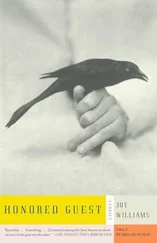“It’s bad for anyone’s kidneys, wine,” Bettencourt said.
“That’s only the very good wine,” the child said, “with the stones, the silt, on the bottom. And that’s only if you drink that part, the bottom of it. We haven’t the means to buy very good wine, so I’m sure we’re quite safe.”
“Oh my dear,” the lady said, still stroking the child’s bangs, “where do you hear such things?”
“Well, Daddy tells me everything of course. He tells me the things I should know and the things I shouldn’t know. And he tells me which is which. As God says, ‘I set before you the way of life and the way of death.’ That’s in Jeremiah. And Daddy has done that for me.”
“You’re a lucky little girl,” Morgan said boisterously. “And you’re just a little girl certainly but soon you’ll be all grown up and what will you be?” He sucked on his teacup, found it was empty, swallowed, regardless, twice. “What will you want to be then, eh?”
“The child has a cold,” Mrs. Morgan said. “Don’t push.”
The child looked out the window, past the sparrow, along the rock ledge that plunged into the sea. Beneath the surface were the fishes and beneath them, caves, and beneath the caves were sightless, creeping creatures, wailing with a whale’s song from everlasting starvation and beneath the creatures was the bottom of the earth and below that, the wealth and terror of everything. The child chewed on her hands. The seaweed on the ledges was delicate as lace, sheathed in ice and shining in the sunlight. There was dead ice and living ice, her father had told her. One was white and one was blue. Everything was living and dead together. There was always some part of you that was dead. There was always some part of you that didn’t need anything and couldn’t help a living soul.
“Well, I just couldn’t know what you mean by that,” she said. “I am what I am. Next Tuesday morning we’re getting up before the sun and we’ll spend the next three days singing and talking to all those people off of Marlsport, on those islands. We did the same last year, if you remember. Father and I were gone three days. It was a very rewarding experience. Everyone got together and baked Daddy a cake in the shape of a Bible open to the Psalms. It was the largest cake I’d ever seen. I don’t know where they could have got the pans. It was white with red icing. It was close to Valentine’s Day that year and Daddy cut me a big piece of cake and served me first and said, ‘This is for my one and only Valentine.’ ”
They catch each other’s eyes above the child. The two women who have left the kitchen can be heard as they move about through the empty rooms. Peter gets up abruptly from his stool by the stove. Peter farms a little. A luckless man, with allergies, but vain. He gives the child a little pat and then goes to a closet, opens it. Turns away. Pushes on a light. Then walks with a quick step through the house. Some present murmur. They feel like a mob. They feel slightly dangerous to themselves. The women think of a vast sale, the sale of the century, where fantastic bargains are offered. The men are ruttish, warm. They think how long the nights are, how cold; how little warmth familiarity brings. They are in this house at last. Though they have been guests here before, it was not the same. They would like to take something from here. What? They want to steal something from this place, anything, something trivial. Who knows? They want to push this child away, put her in her place, this silly simple child who makes them feel so rancorous. Nothing is here for their taking. This makes Bettencourt nervous, almost sick. He has always had this problem.
BETTENCOURT HAS TO THIEVE A LITTLE, otherwise he feels that he himself has been robbed. Each year, late in the spring, he and his wife drive down to Boston for two days. It is their anniversary. Each year they stay at the Parker House. He steals dinner rolls, glasses. The last time he took $1.85 from the pay radio in their room. Once, on the trip home, on the new highway snaking around the city, a station wagon in front of them lost a suitcase from its luggage rack. The rope securing it to the roof broke and a dimity-covered suitcase sailed across the highway. It landed in Bettencourt’s lane, exploding on contact into a bright flower of ladies’ weaknesses, clothes, hats, little purses and boxes and bottles. Bettencourt was a slow driver. He witnessed this slowly. He braked to a stop beside the broken suitcase. The station wagon backed up. Bettencourt’s ready help was much appreciated. The occupants of the station wagon were a man and two shiny blond women just off the ferry at Woods Hole. Bettencourt was fearless and shambling quick. His wife screamed for his safety as the cars whistled past. Everything was snatched from the asphalt and thrown in the back seat of the wagon amidst many regrets and wild thanks from the women. The rest of the trip was without incident for Bettencourt. His wife sat in the back seat. When they crossed the border into Maine, she sang all the verses of the Maine Stein Song. She had been doing this all her life, every time they came back from Boston, even though she had never gone to the university. Bettencourt never sang along. In this particular case, he drove with a pair of panties in his pocket. They were the color of peaches. On the left hip of them was Tuesday in pretty scroll-sewn letters. The thought that all the days of the week were represented in such a way made him gloomy and dissatisfied. The panties, he thought, were of silk. There wasn’t enough to them to cover his wife’s elbow. He had them still, and he enjoyed having them, even though he didn’t look at them very often.
Now Bettencourt is in the Reverend’s house. It is all he can do to keep from scowling at the child. She seems both burden and obstruction. She seems to block something in his mind. Like the black water, he works every day, setting and pulling his traps and nets, there is something into which he cannot look. She stands by the window, regarding them all absently, patting her dog. She is tightly cinched into her bathrobe. The cord of it belonged to some other garment and was too long. She had wrapped it around herself twice.
Bettencourt’s hands had been toying with a paper envelope of pills that were lying on the table. He slides them in his glove. They are pills for the dog, obtained from a veterinarian. The dog has ulcers in his ears and the howling of the wind here bothers him. They are for the dog’s pain. Bettencourt does not know this. He would not plan to swallow the pills anyway. He wants merely to remove something from this house. Now he has done so. But he knows that he has been duped. The child sees the pills disappear. Life is so artless, is it not? There is so much that meets the eye?
The child said, “On Saturday nights Daddy and I dance upstairs. It’s always chilly in that room. Our breath stays in that room as long as we do. The snow can fall right into that room when the wind is right. On Fridays we sometimes dance too. And those nights he gives me my bath. We’re not in need of anything that I can think of.” She looked at the painting all wrapped up. “You really shouldn’t have,” she said, “and I hope this isn’t perishable, for we haven’t the room for it. Perhaps you could take it back until another time …”
The men and women are scattered throughout the house, walking, rattling doorknobs. They still wear their heavy outdoor coats. Their boots make wallowing tracks in the floor’s dust. They look through the windows at the bright, starved landscape. The house seems abandoned; it simply cannot be lived in. Whatever they are searching for has already been taken.
And behind them is the child’s voice. She had not followed them but she has such a pervasive, inhibiting quality that they feel she is at their backs. They have seen her everywhere. Grocery, graveyard, boat basin, tumbled duck-blind. She is that part of their days that they cannot come to terms with. She is that part of themselves that they cannot recognize. In springs past, they have watched her, trotting a horse through the crumbling frost-heaved streets of the town and into the sea. She wore gray jodhpurs crusted with sea water and the animal’s sweat. She wore a small stern blouse, buttoned tightly at the throat and wrists. They heard her high clear voice at dawn and dusk and holidays, bringing the horse to a gallop. Now the horse is dead too. A big clay-colored horse with a black mane and no name. Its legs got thick as railroad ties and it cried blood-stained tears before it died. The child cries herself, even now, when she speaks of the horse. They remember the day the carcass was burned, behind the owner’s barn. It smoked and smoked, a hopeless blue. They remember her walking through the town, fumbling at the wide hips of her jodhpurs, trembling, the tears springing from her eyes. The breeches were second hand, brittle, about to tear. They remember her as she walked stiffly past their houses, her hair white with dusty grain, and then began to trot, to canter, changing leads, loping miserably in her shined boots beneath the smoking sky.
Читать дальше












